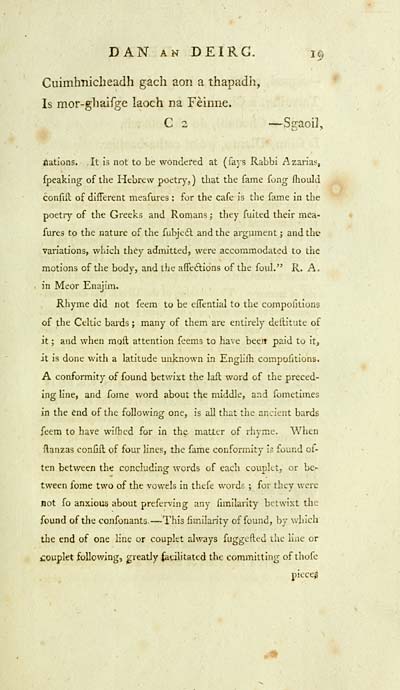Ossian Collection > Sean dana
(31)
Download files
Complete book:
Individual page:
Thumbnail gallery: Grid view | List view

DAN an DEIRG. 19
Cuimhnicheadh gach aon a thapadh,
Is mor-ghaifge laoch na Fèinne.
C 2 — Sgaoii,
Nations. It is not to be wondered at (fays Rabbi Azaria^,
fpeaking of the Hebrew poetry, ) that the fame fong ftiould
confiit of different meafures : for the cafe is the fame in the
poetry of the Greeks and Romans ; they fuited their mea-
fures to the nature of the fubjcct and the argument ; and the
variations, which they admitted, were accommodated to the
motions of the body, and the affections of the foul." R. A.
in Meor Enajim.
Rhyme did not feem to be effential to the compofitions
of the Celtic bards ; many of them are entirely deftitute of
it ; and when mad attention feems to have been paid to it,
it is done with a latitude unknown in Engiifh compofitions.
A conformity of found betwixt the lafl word of the preced-
ing line, and fome word about the middle, and fometim.es
in the end of the following one, is all that the ancient bards
feem to have wifhed for in the matter of rhyme. When
ftanzas confiil of four lines, the fame conformity is found of-
ten between the concluding words of each couplet, or be-
tween fome two of the vowels in thefe words ; for they were
not fo anxious about preferving any fimilarity betwixt the
found of the confonants. — This fimilarity of found, by which
the end of one line or couplet always fuggefted the line or
vouplet following, greatly facilitated the committing of thofe
pieceg
Cuimhnicheadh gach aon a thapadh,
Is mor-ghaifge laoch na Fèinne.
C 2 — Sgaoii,
Nations. It is not to be wondered at (fays Rabbi Azaria^,
fpeaking of the Hebrew poetry, ) that the fame fong ftiould
confiit of different meafures : for the cafe is the fame in the
poetry of the Greeks and Romans ; they fuited their mea-
fures to the nature of the fubjcct and the argument ; and the
variations, which they admitted, were accommodated to the
motions of the body, and the affections of the foul." R. A.
in Meor Enajim.
Rhyme did not feem to be effential to the compofitions
of the Celtic bards ; many of them are entirely deftitute of
it ; and when mad attention feems to have been paid to it,
it is done with a latitude unknown in Engiifh compofitions.
A conformity of found betwixt the lafl word of the preced-
ing line, and fome word about the middle, and fometim.es
in the end of the following one, is all that the ancient bards
feem to have wifhed for in the matter of rhyme. When
ftanzas confiil of four lines, the fame conformity is found of-
ten between the concluding words of each couplet, or be-
tween fome two of the vowels in thefe words ; for they were
not fo anxious about preferving any fimilarity betwixt the
found of the confonants. — This fimilarity of found, by which
the end of one line or couplet always fuggefted the line or
vouplet following, greatly facilitated the committing of thofe
pieceg
Set display mode to: Large image | Transcription
Images and transcriptions on this page, including medium image downloads, may be used under the Creative Commons Attribution 4.0 International Licence unless otherwise stated. ![]()
| Early Gaelic Book Collections > Ossian Collection > Sean dana > (31) |
|---|
| Permanent URL | https://digital.nls.uk/77328918 |
|---|
| Description | Selected books from the Ossian Collection of 327 volumes, originally assembled by J. Norman Methven of Perth. Different editions and translations of James MacPherson's epic poem 'Ossian', some with a map of the 'Kingdom of Connor'. Also secondary material relating to Ossianic poetry and the Ossian controversy. |
|---|
| Description | Selected items from five 'Special and Named Printed Collections'. Includes books in Gaelic and other Celtic languages, works about the Gaels, their languages, literature, culture and history. |
|---|

